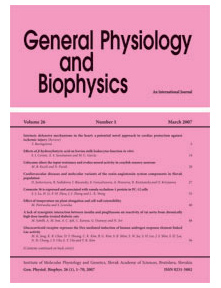Journal info
Aims and Scope |
||
Select Journal
Journals
Bratislava Medical Journal Endocrine Regulations General Physiology and Biophysics 2024 2023 2022 2021 2020 2019 2018 2017 2016 2015 2014 2013 2012 2011 2010 2009 2008 2007 Neoplasma Acta Virologica Studia Psychologica Cardiology Letters Psychológia a patopsych. dieťaťa Kovove Materialy-Metallic Materials Slovenská hudbaWebshop Cart
Your Cart is currently empty.
General Physiology and Biophysics Vol.41, No.2, p. 141–150, 2022 |
||
| Title: Neonatal administration of zingerone prevents the subsequent development of high dietary fructose-induced early features of nephropathy in rats | ||
| Author: Nasiru Muhammad, Busisani W. Lembede, Kennedy H. Erlwanger | ||
| Abstract: Excessive consumption of fructose-rich diets in early life stages increases the risk for developing nephropathy in adulthood. We investigated the potential preventive effects of neonatally administered zingerone on the development of dietary fructose-induced nephropathy. Four-day-old suckling male and female rat pups were orally gavaged (10 ml/kg) with: distilled water (Con group), 20% fructose solution (Fru group), 20% fructose solution + 40 mg/kg zingerone in distilled water (ZFru group), or 40 mg/kg of zingerone (Zgr group) for 14 days. Thereafter, Con and Zgr groups continued on plain drinking water while Fru and ZFru groups drank 20% fructose solution ad libitum for 10 weeks. The Fru group had significantly increased plasma concentration of the renal injury marker kidney injury molecule one (KIM-1) and decreased glomerular urinary space area compared to the controls in both sexes (p < 0.05). These alterations were prevented by neonatally administered zingerone. Zingerone administration neonatally is a potential prophylaxis for long-term high-fructose diet-induced nephropathy. |
||
| Keywords: Fructose — Neonates — Nephropathy — Rats — Zingerone | ||
| Published online: 11-Apr-2022 | ||
| Year: 2022, Volume: 41, Issue: 2 | Page From: 141, Page To: 150 | |
| doi:10.4149/gpb_2022008 |
||
|
|
 download file download file |
|

